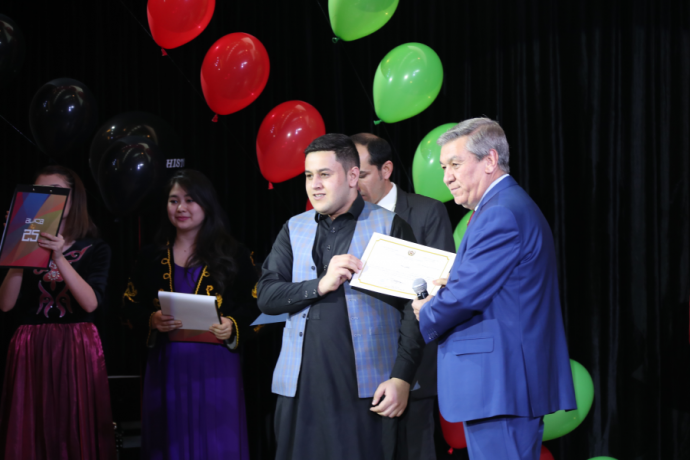News
Success Story: Shamsuddin Amin, Politics and Security '2020
My name is Shamsuddin Amin, I am an OSCE Academy alumnus of 2020 majoring in Politics and Security. After completion of my studies, I returned to Afghanistan to serve my homeland, and work towards its betterment. I began my career as a lecturer of Law and Political Science at Al-Taqwa Institute of Higher Education where I was teaching courses on Political Economy and Contemporary Global Political Issues. Due to the COVID-19 lockdown measures, we moved to online format, and continued teaching until May 2021. At the same time, I served as regional project manager with the Future Generations Afghanistan in Eastern Afghanistan. In there, I championed for and successfully received funding for projects that aimed to economically uplift and empower women, refuges, and farming communities in rural Laghman and Kunar provinces.
Having spent a good deal of time implementing various projects, I figured out a fundamental problem and deficit in humanitarian and developmental projects being implemented, specifically in the sphere of economic and agricultural development. Most of these projects were being implemented on an outdated, flawed, and fraudulent system—established in late 2001 under the National Solidarity Program (NSP)—that not only led to inefficiency, and failure to meet project objectives; but also made these projects susceptible to corruption. As a solution, in February 2021, I began working on a new concept that not only would address the above-mentioned issues, but would help better integrate, modernize, and promote development in rural communities. In this vein, I undertook a fundamental task to seek support from various funding agencies to implement and bring the concept into reality. The concept relied on already established practices in community development and was coupled with a localized version of the concept of unions. To test the effectiveness of the concept, we requested the World Food Program through a comprehensive proposal seeking a seed capital of USD 325, 000 to implement a test version of the project across four districts in Laghman and Kunar Provinces. The project aimed to establish farmers and women unions in the targeted communities. And to provide them specialized support in terms of technical and microfinance and business expertise and knowledge through localized and easy to understand measures. These were complemented by agricultural machinery and input in terms of certified wheat seed and fertilizers.
The fundamental reason I had for farmers’ unionization at the time was that when farmers are unionized and work closely with each other, their ability to tackle problems and challenges in terms of human resources increase, hence, they can better deploy, utilize, and integrate the available resources to tackle challenges. I developed a strategy that helped in establishing three primary types of farmers unions at the local, at the district, and at the provincial level, for better access, proper management of resources and on-time management of crisis that farmers face.
Although, Afghanistan has a localist society, and mostly farming is referred or accepted practice for men, however, women also take part in the farming activities at various levels. However, their participation at livestock activities is more noticeable. As we were targeting farming households, I aimed to integrate women as direct beneficiaries of the project to further support their activities in the society and to economically empower them. Thus, the project aimed to unionize 1,000 women headed households and to work with them by providing them technical support, expertise, and tools to increase their economic output and to empower women led microbusinesses. We provided selected support to women in terms of purchasing livestock, establishing kitchen gardens, and helping them overall in establishing and leading microbusinesses.
At the same time, with the help of our committed team at Future Generations Afghanistan, and the financial support of Food and Agriculture Organization of the United Nations (FAO), we secured an emergency funding to provide financial support to 3,000 farmers and vulnerable households in rural Laghman. This project with a budget of USD 200, 000 was implemented under the already existent NSP structures. The project not only served as a direct assistance to communities that were ravished by the heightening insurgency and war against the Taliban, but also served a crucial aim to comparatively assess and study the effectiveness of the project activities across the targeted communities. It re-affirmed my findings of the inefficiencies of the system, and convinced the local departments of Economy, and Department of Agriculture as to the effectiveness of the alternative concept of unionization.
To conclude, from May through the end of August 2021, we were able to establish, register and unionize 18 farmer’s unions and 18 women economic empowerment groups under these unions that integrated 4,600 households across Laghman and Kunar Provinces, with all its members having been formally registered with the government, their biometrics taken and have received initial trainings on unions, microbusiness management, market linkage and pre-harvest agriculture technical trainings. The project’s initial phase ended in May 2022, and having assessed its success, the project was renewed with additional funding of over USD 500, 000 to be implemented across four other districts in the two provinces.



 Русская версия
Русская версия